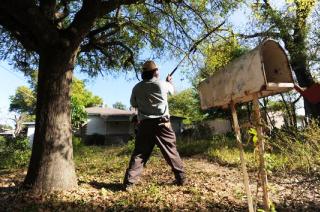TAMPA Marcos Rosales' landscaping crew pulled up last week in front of an abandoned East Tampa house and found an overgrown mess.
Grass and weeds were waist high. The driveway and sidewalk were covered in fallen leaves and runaway plants. The bushes stood taller than a man.
Then it got worse.
|
Contractors working for the city are mowing more unruly, overgrown properties that are in foreclosure or abandoned. |
As houses have fallen into foreclosure or been abandoned by their owners, the grass has run wild. In some cases, houses have become dumping grounds or havens for squatters, prostitutes and drug dealers.
Increasingly, it has fallen to city officials to maintain houses whose owners have failed to do so. And Tampa's not alone.
"It's a big deal," said Wesley Chapel resident Ken Small, financial technical assistance manager at the Florida League of Cities. "Tax base aside, it's about crime. It can be a fire hazard. It definitely can become a health hazard."
Tampa has hired a contractor, Complete Land Care, to mow abandoned properties. Rosales, the crew chief, said his workers clean eight to 10 properties a day. Some take a half-hour. One took nearly three days.
"We never know what we're going to find," he said.
From last March through the end of January, the city filed more than $133,000 in liens and legal fees for mowing 340 properties. It collected just over half that amount in payments. Last week, the city council signed off on 82 more liens worth about $35,500, city records show.
At a time when the city is struggling financially, the mowing is a costly but necessary expense, said Mayor Bob Buckhorn.
"If you don't do it, then there's a cancer created in the neighborhood," Buckhorn said. "To me, the short-term investment makes a lot more sense," he said.
Under normal conditions, liens are repaid when a property changes hands. Of late, that has meant when a house moves back to bank ownership. But with so many houses lingering in legal limbo, it's unclear when or if the city will get its money back.
Assistant City Attorney Ernie Mueller argues the city's claim can't be ignored or reduced in foreclosure. They fall second to property taxes on the list of claims that get paid after a bank resells a foreclosed home, he said.
"Eventually we'll get repaid," he said.
But the Florida Supreme Court is considering a case from Palm Bay that questions whether a lien is equal or nearly equal to a city's tax claim.
In some cases, liens have fallen behind taxes and the unpaid mortgage in foreclosure priorities. That can leave cities holding the bag if the repayment money runs out after a foreclosed property sells, said Mark Lawson, a Tallahassee lawyer who advises local governments on financial issues.
Lawson says a stronger option would be for a city to file a special assessment against a property needing cleanup. That assessment travels with the tax bill, giving it a much better chance of being repaid after the foreclosure runs its course, he said.
The city council has scheduled a workshop for Thursday to look for better ways to handle – and pay for -- the mowing work.
"We have to find a way," said Councilman Frank Reddick. "This current system is not working."
Reddick represents the handful of economically hard-hit neighborhoods — Sulphur Springs, Tampa Heights, V.M. Ybor and East Tampa — that accounts for about two-thirds of the mowing work, according to city records.
"It's a problem," Reddick said. "There's a lot of money to be spent. But those people who are taking care of their property and paying property taxes deserve a safe environment."
Kim Headland, president of the V.M. Ybor neighborhood association, said the city's efforts supplement the work residents are doing to clean up their community, which sits in the crook where Interstate 275 meets Interstate 4.
The neighborhood has a lot of vacant houses left behind when speculators went bust. In some cases, neighbors care for empty properties. In other cases, the city does it.
Neither the banks nor the foreclosed owners do much to help out, Headland said.
"They're in that limbo," she said.
